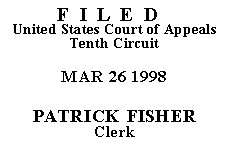

| UNITED STATES OF AMERICA,
Plaintiff-Appellee, v. WALTER KNIGHT, Defendant-Appellant. |
|
Defendant-appellant Walter Knight, appearing pro se, appeals the district court's order dismissing his post-appeal motions to vacate his conviction for violating 18 U.S.C. § 922(g)(1), convicted felon in possession of a firearm. Defendant alleges the federal court was without jurisdiction to prosecute him because the State of Colorado, not the federal government, had jurisdiction over the geographical location where the criminal activity occurred. Defendant further alleges his attorney provided constitutionally ineffective assistance for failing to raise this claim, and the federal prosecutor is liable for damages based on the decision to file criminal charges against him absent federal jurisdiction.
This court has previously rejected the argument raised here by defendant that the federal district court is without jurisdiction to prosecute crimes because the States are sovereign. See United States v. Lampley, 127 F.3d 1231, 1245-46 (10th Cir. 1997), cert. denied, 118 S. Ct. 1098 (1998). "[S]o long as there is a constitutionally authorized federal nexus, the federal government is free to act anywhere within the United States." Id. at 1246. "Section 922(g)'s requirement that the firearm have been, at some time, in interstate commerce is sufficient to establish its constitutionality under the Commerce Clause." United States v. Bolton, 68 F.3d 396, 400 (10th Cir. 1995) (quotation omitted).
Defendant relies on 40 U.S.C. § 255 for his argument that the government was required to establish jurisdiction over the location of his criminal activity to establish its jurisdiction to prosecute him for violating a federal criminal statute. Section 255, which pertains to purchase of land by the United States, does not require that the government acquire title to the property on which a crime occurred as a prerequisite to a criminal prosecution. Therefore, we hold that the federal district court had jurisdiction to prosecute defendant for violating § 922(g)(1).
Because the federal court clearly had jurisdiction to prosecute defendant, we reject his malicious prosecution claim based on his belief that the federal prosecutor was without jurisdiction to file criminal charges. Similarly, we reject defendant's claim of ineffective assistance of counsel. Counsel's failure to challenge the federal court's jurisdiction over defendant did not constitute ineffective assistance because the issue is without merit. See United States v. Cook, 45 F.3d 388, 392-93 (10th Cir. 1995) (counsel's failure to raise a meritless issue is not constitutionally ineffective assistance of counsel).
Defendant's pending motions are denied. The judgment of the United States District Court for the District of Colorado is AFFIRMED. The mandate shall issue forthwith.
Entered for the Court
Circuit Judge
*. This order and judgment is not binding precedent, except under the doctrines of law of the case, res judicata, and collateral estoppel. The court generally disfavors the citation of orders and judgments; nevertheless, an order and judgment may be cited under the terms and conditions of 10th Cir. R. 36.3.